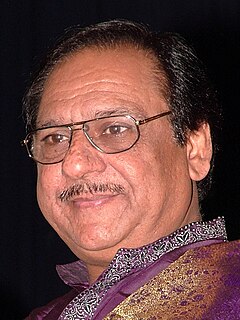Related Research Articles

Mehdi Hasan Khan was a Pakistani ghazal singer and playback singer for Lollywood. One of the greatest and most influential figures in the history of ghazal singing, he is referred to as the "Shahenshah-e-Ghazal". Known for his "haunting" baritone voice, Mehdi Hassan is credited with bringing ghazal singing to a worldwide audience. He is unique for his melodic patterns and maintaining integrity of the ragas in an innovative way.

Ustad Ghulam Ali is a Pakistani ghazal singer of the Patiala Gharana. He has also been a prominent playback singer in bollywood. Ghulam Ali was a disciple of Bade Ghulam Ali Khan. Ali was also trained by Bade Ghulam Ali's younger brothers – Barkat Ali Khan and Mubarak Ali Khan.
Nirala, real name Syed Muzaffar Husain Zaidi was a Pakistani comedian and film actor. He only appeared in Urdu films made in Pakistan. His first film was Aur bhi gham hain (1960). His last film was Choroan Ka Badshah, which was released in 1988. His most successful film was Armaan in 1966, in which he played a supporting role with Waheed Murad.

Himani Bhatt Shivpuri is an Indian actress known for her character roles in Bollywood films and Hindi soap operas. Her films include Hum Aapke Hain Koun..! (1994), Raja (1995), Dilwale Dulhania Le Jayenge (1995), Khamoshi (1996), Hero No. 1 (1997), Deewana Mastana (1997), Bandhan (1998), Kuch Kuch Hota Hai (1998), Biwi No.1 (1999), Hum Saath-Saath Hain (1999), Kabhi Khushi Kabhie Gham... (2001) and Main Prem Ki Diwani Hoon (2003).
Waqar Ali is a Pakistani musician and singer working mostly in Pakistan.
Amjad Islam Amjad, PP, Sitara-e-Imtiaz is an Urdu poet, drama writer and lyricist from Pakistan. The author of more than 40 books in a career spanning 50 years, he has received many awards for his literary work and screenplay for TV, including Pride of Performance and Sitara-e-Imtiaz Awards.
K. P. Saxena was an Indian satirist and writer. He was employed by the Indian Railways and was a prolific writer for magazines and newspapers. He started writing for Doordarshan's famous serial Bibi Natiyon Wali. He wrote vyangya articles for almost every popular magazine of Hindi. His first book of satire Koi Patthar Se Na Mare was published in 1982. His style is unique and he is very popular among poets in Kavi Sammelans. He was an expert of three Indian language Urdu, Hindi and Awadhi. He was awarded Padma Shri by Government of India, in year 2000. He died on 31 October 2013. He was a regular in Hindi Kavi Sammelan.
Gham may refer to:

Mehr Lal Soni, better known as Zia Fatehabadi, was an Indian Urdu ghazal and nazm writer. He was a disciple (shaagird) of Syed Aashiq Hussain Siddiqui Seemab Akbarabadi (1882–1951), who was a disciple of Nawab Mirza Khan Daagh Dehlvi (1831–1905). He used the takhallus of Zia meaning "Light" on the suggestion of his teacher, Ghulaam Qadir Farkh Amritsari.
This article is a filmography of playback singer and composer Amit Kumar.
Supriya Karnik is an Indian television actress and character artist in Bollywood, known for her negative roles. She is highly popular for portraying comic roles in super-hit movies Mujhse Shaadi Karogi and Welcome.
Krishan Mohan was an Indian Urdu poet who gained prominence after India gained independence from the British Raj.
References
- ↑ Lok Sabha Debates, Parliament of India, Government of India, 1983,
... 'Aur Bhi Gham Hain Zamane Mein' which fulfil the twin objectives of education and entertainment ...
- ↑ Parliamentary debates: official report, Volume 120, Issues 9-13, Rajya Sabha, Parliament of India, Government of India, 1981,
... 'Aur Bhi Gam Hain Zamane Mein' a serial is telecast on fortnightly basis highlighting social problems, behaviour and attitudes ...